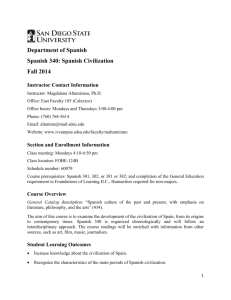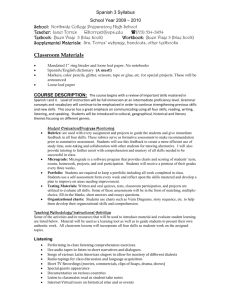Sample SYLLABUS SPAN 253
advertisement
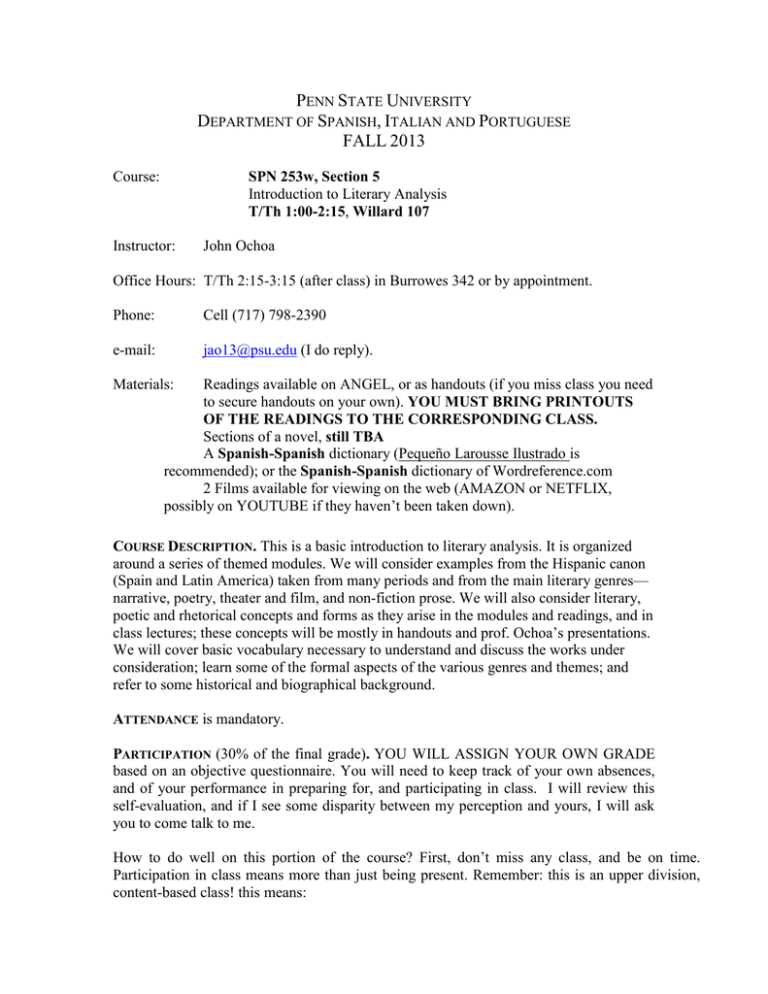
PENN STATE UNIVERSITY DEPARTMENT OF SPANISH, ITALIAN AND PORTUGUESE FALL 2013 Course: SPN 253w, Section 5 Introduction to Literary Analysis T/Th 1:00-2:15, Willard 107 Instructor: John Ochoa Office Hours: T/Th 2:15-3:15 (after class) in Burrowes 342 or by appointment. Phone: Cell (717) 798-2390 e-mail: jao13@psu.edu (I do reply). Materials: Readings available on ANGEL, or as handouts (if you miss class you need to secure handouts on your own). YOU MUST BRING PRINTOUTS OF THE READINGS TO THE CORRESPONDING CLASS. Sections of a novel, still TBA A Spanish-Spanish dictionary (Pequeño Larousse Ilustrado is recommended); or the Spanish-Spanish dictionary of Wordreference.com 2 Films available for viewing on the web (AMAZON or NETFLIX, possibly on YOUTUBE if they haven’t been taken down). COURSE DESCRIPTION. This is a basic introduction to literary analysis. It is organized around a series of themed modules. We will consider examples from the Hispanic canon (Spain and Latin America) taken from many periods and from the main literary genres— narrative, poetry, theater and film, and non-fiction prose. We will also consider literary, poetic and rhetorical concepts and forms as they arise in the modules and readings, and in class lectures; these concepts will be mostly in handouts and prof. Ochoa’s presentations. We will cover basic vocabulary necessary to understand and discuss the works under consideration; learn some of the formal aspects of the various genres and themes; and refer to some historical and biographical background. ATTENDANCE is mandatory. PARTICIPATION (30% of the final grade). YOU WILL ASSIGN YOUR OWN GRADE based on an objective questionnaire. You will need to keep track of your own absences, and of your performance in preparing for, and participating in class. I will review this self-evaluation, and if I see some disparity between my perception and yours, I will ask you to come talk to me. How to do well on this portion of the course? First, don’t miss any class, and be on time. Participation in class means more than just being present. Remember: this is an upper division, content-based class! this means: *coming prepared every day—having read and understood the assignment, having watched any film or web assignments, and having answered any comprehension or discussion questions. *researching the vocabulary, and any information on the issues raised by the material, so you can better contribute to the discussion with informed opinions or questions *actively asking and answering questions in class *offering and defending your own views as well as reacting to others’ points of views expressed by your classmates. Respectfully, of course. *listening with interest to your classmates’ contributions and engaging with them: asking questions about presentations, responding to their opinions, offering your own opinions, being receptive and respectful of their positions. We will review the answers to readings, films or other materials at the beginning of class, and I will call on students to answer. Even if you didn’t understand all of the material, you can demonstrate you tried: if you didn’t understand it, come with your own questions about it; if you couldn’t answer a particular comprehension question, explain why it was difficult, perhaps others will help you. Hopefully the comprehension questions will open broader discussion about the works at hand; your active contribution in this discussion expected, and useful. Ask questions about my lectures in class; ask question of your fellow students’ presentations; this counts for participation as well. The class is conducted as a seminar; Although I will give lectures and background information, your active participation is expected. It is important for you to engage with the discussion: this is how I get an idea if you’re keeping up with the material. Again: You will grade yourself for participation, and I will review it. This is a sample form (you will need to fill out three throughout the semester): PARTICIPATION SELF-EVALUATION (5 weeks,) YOU MUST COMPLETE THIS HONESTLY I am asking you to assess honestly your own class participation for the first half of the semester, and to assign yourself a grade based on the following criteria in rough order of importance: , coming to all classes on time and prepared, having read and thought about the assigned material or watched the film, having answered any pre-assigned questions, looked up relevant vocabulary; when in class, volunteering answers to questions; being actively engaged in open class discussion and offering comments; asking questions yourself; actively engaging in small group exercises. Use the following rough descriptions to assess your performance; number of missed classes is NOT NEGOTIABLE. On the other categories, you might feel you have done better or worse than those described, so find the one that generally fits you the best and adjust up r down. Participation Grade GENERAL description A (TOP grade) I missed maximum of 1 class for whatever reason, excused or not (this is firm). I come ready to discuss, and do so as often as I can.s I actively participate in discussion and small group exercises, and I often take the lead. I always come prepared to class by having thoroughly read the assignment or seen the film or website ahead of time, having looked up unfamiliar vocabulary, and having answered all the questions. Even for the one class I missed I completed the reading and questions. B I have missed class a maximum of 2 times (this is firm). I answer questions, contribute well to class discussions, actively engage in group exercises. I come to class having completed the reading and ay discussion questions before class at least 80-85% of the time. C I have missed a maximum of 3 times. I complete the reading and vocabulary before class about 50-70% of the time. I frequently get my answers to the questions from class, or from my fellow students afterwards, instead of from reading on my own ahead of class. I participate whenever I’m in class. D I have missed 4 classes or more (this is firm); I complete the assignment and questions on time about 50% of the time or less. I participate whenever I’m in class. 65% or below: I probably should drop the class. I HAVE MISSED ________ CLASSES TOTAL. POSSIBLE RANGE: A A- B+ B B- C+ C C- D I THINK MY FAIR PARTICIPATION GRADE SHOULD BE: _______ I will consider your self- evaluation, reserving the right to change it. If there is a significant disparity between my assessment (especially exam grades) and yours, I will ask you to come discuss it with me. JO Signature__________________________________________ Name (PRINT)_____________________________________ There will be opportunities to supplement your participation grade, such as being Policía de vocabulario (we will discuss these in class) TESTS AND QUIZZES (45%). The dates for the three scheduled in-class tests are in the syllabus. There is no cumulative final or midterm. Each of these tests will cover the material from the last test onward. They will consist of short questions covering basic reading comprehension, vocabulary from the lists of the policía de vocabulario, as well as materials from class lectures, and a little from the presentations from your fellow students. Any quizzes will be unannounced, and may or may not happen. No make-ups will be given. You may take an exam in advance for an anticipated excused absence (university sponsored event, religious observance). If you miss an exam due to an unanticipated excused absence (severe illness, family emergency, etc.) then your total exam grade will be averaged with one less exam, and you will not be penalized for your missed exam. You may be required to provide documentation to have your absence excused. You will receive no credit for any additional missed exams. ORAL PRESENTATIONS. (8%) Building your spoken ability and vocabulary is a crucial aspect of this course. You will be responsible for one oral presentation; the topics and dates will be arranged in advance with me, and should conform to the given theme of the module. You should consult with me briefly before your presentation. You may use notes, visual or sound aids, and handouts, but please don’t read from a prepared text. If you got information from another source, please provide a rough sketch what these were (this may be a printed sheet, or at the end of a PowerPoint presentation if you use one). BE mindful of your fellow students, and be prepared to explain unfamiliar vocabulary (put it up on the board, or hand out a list) Presentations will be evaluated with the following criteria: EVALUATION SHEET FOR INDIVIDUAL ORAL PRESENTATIONS Name:________________________________Topic________________________ List of sources (if appropriate)? Y/N DISCUSSION/QUIZ QUESTIONS?___________ 66% Oral performance Fluency: could fellow students understand? 1 2 3 4 5 6 Usage (vocabulary, etc.) 1 2 3 4 5 6 Flow, rhythm 1 2 3 4 5 6 Grammar 1 2 3 4 5 6 34% Content of the presentation: Depth of Information Organization of material /argument Engagement with the module concepts/themes 1 1 1 2 2 2 3 3 3 4 4 4 5 5 5 6 6 6 FINAL SCORE (Weighted)______ WRITTEN WORK (17% OF THE GRADE) This is a “W” course, which means we will be working on composition. There will be 2 writing exercises. One short one will be IN CLASS, another will a longer essay, completed on your own, and may be an extension of your presentation (we can discuss the specifics). GRADE BREAKDOWN: Class Presentation 3 Section exams, any pop quizzes Written work Class Participation (3 self-evaluations) 8% 45% 17% 30% if you wish to know more about my precise grading standards and practices, you can consult my website for much, much more detail: http://www.personal.psu.edu/jao13/blogs/professor_ochoas_materials_a nd_documents/ Some legalese, but important, notices: ANY ACT OF PLAGIARISM AS DEFINED IN THE STUDENT MANUAL WILL RESULT IN A FAILING GRADE FOR THE COURSE, AS WELL AS DISCIPLINARY ACTION Penn State defines academic integrity as the pursuit of scholarly activity in an open, honest and responsible manner. All students should act with personal integrity, respect other students’ dignity, rights and property, and help create and maintain an environment in which all can succeed through the fruits of their efforts (Faculty Senate Policy 49-20) Dishonesty of any kind will not be tolerated in this course. Dishonesty includes, but is not limited to, cheating, plagiarizing, fabricating information or citations, facilitating acts of academic dishonesty by others, having unauthorized possession of examinations, submitting work of another person or work previously used without informing the instructor, or tampering with the academic work of other students. Students who are found to be dishonest will receive academic sanctions and will be reported to the University’s Judicial Affairs office for possible further disciplinary sanction. Penn State welcomes students with disabilities into the University's educational programs. If you have a disability-related need for reasonable academic adjustments in this course, contact the Office for Disability Services (ODS) at 814-863-1807 (V/TTY). For further information regarding ODS, please visit the Office for Disability Services Web site at http://equity.psu.edu/ods/. In order to receive consideration for course accommodations, you must contact ODS and provide documentation (see the documentation guidelines at http://equity.psu.edu/ods/guidelines/documentation-guidelines). If the documentation supports the need for academic adjustments, ODS will provide a letter identifying appropriate academic adjustments. Please share this letter and discuss the adjustments with your instructor as early in the course as possible. You must contact ODS and request academic adjustment letters at the beginning of each semester. Semana Semana 1 Semana 2 Semana 3 Semana 4 Semana 5 Semana 6 Semana 7 Semana 8 CORREGIDO 8/26 Mitos de creación—¿Cómo se hizo? Monterroso “el dinosaurio”; “Génesis 1” de La biblia Popol Vuj “Historia de Ixquic;” Rodríguez Freyle, “El dorado” Primera presentación: Prof. Ochoa. ¿Mentira, ficción u otra realidad? COMO CONVENCER: verosimilitud, mimesis, y retórica VEROSIMILITUD Saki, “An Open Window”; Arreola, “El guardagujas” Borges, “Emma Zunz” García Márquez “Un señor muy viejo con alas enormes”; Presentaciones El amor y otros desastres: los sonetos y la tradición petrarquista Presentación/taller de poesía: LA MÉTRICA y el soneto; Sor Juana “Un recelo” Petrarca; Garcilaso. PETRARQUISMO RETÓRICA; San Juan de la Cruz; Sor Juana; Góngora; Neruda JUEVES: Presentaciones; REPASO PARA EXAMEN Martes: Examen #1 La tradición épica: Los héroes, sus grandes hazañas. . . “Proezas de Gilgamesh;” “La Ilíada;” “Cantar del mío Cid”. . . . y sus amigos. “Primera Parte de Martín Fierro”; Cervantes Don Quijote; Concolorcorvo, Lazarillo de ciegos caminantes Presentaciones (Film) Diarios de Motocicleta; Presentaciones jUEVES: ejercicio de escritura en clase 143 Stuckeman Building (Architecture Building) Los celos, la venganza--y su escenificación Rodríguez Freyle, “La bruja Juana García;” Cervantes “El marido celoso” Paloma Pedrero, “Resguardo Personal” PRESENTACIONES Semana 9 LONG TEXT, NOVEL TBA XX Presentaciones XX Presentaciones Semana 10 XX presentaciones; Review Jueves: Examen #2 Semana 11 El arte de compromiso Neruda, “United Fruit” Corky Gonzalez, “Yo soy Joaquín” Nancy Morejón, “mujer negra,” Rosario Castellanos, “Kinsey Report”; Picasso, Guernica Presentaciones Semana 12 ¿Podemos contar nuestra propia historia?—problemas con la primera persona. Rigoberta Menchú Me llamo Rigoberta; Presentaciones Lazarillo de Tormes; Borges, “Borges y yo” Semana 13 Los Perros Osvaldo Dragún, “La historia de un hombre que se convirtió en perro” Cervantes, “El coloquio de los perros” Amores Perros (ML); Neruda “Un perro ha muerto” Presentaciones Semana 14 (Thanksgiving) THANKSGIVING—NO Hay Clase Semana 15 Semana 16 Encuentros con el “Otro” o: ¿Qué saben los “Salvajes”? Monterroso, “El eclipse”; Borges, “El evangelio según Marcos” Guillén, “Sensemayá” Gómez Peña y Coco Fusco, “The couple in the Cage” (video en clase) Presentaciones “catch up,” presentaciones. Repaso final. Jueves 12 de Diciembre Examen #3
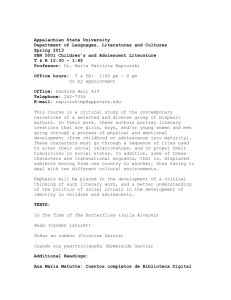

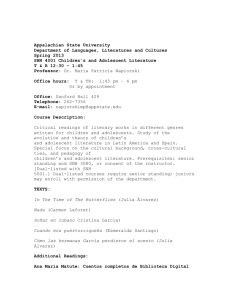
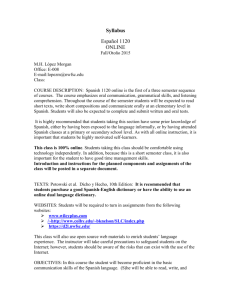
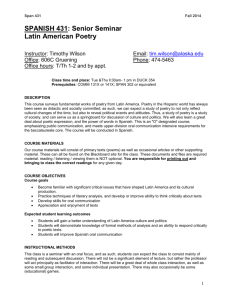
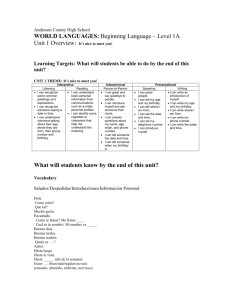
![[updated 1.27.16] - UF Spanish and Portuguese Syllabi](http://s3.studylib.net/store/data/009480414_1-bb401a03e72207b3aa9a3ee4243857b2-300x300.png)
